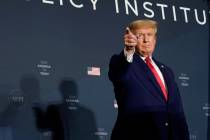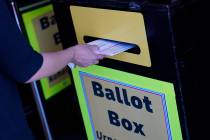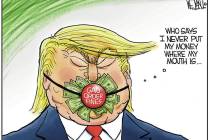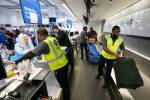Local governments should back off, take regulatory timeout
The deal that Uber and Lyft struck with the Clark County Commission to operate at McCarran International Airport is a mixed blessing.
Consumers should be grateful that they have more options for travelling to and from the airport. But the agreement is another example of the heavy-handed approach city and state governments take to the emerging sharing economy. It would be better to follow the hands-off strategy of federal representatives and officials.
Under the Clark County Commission's agreement, everybody pays: the drivers pay an annual $25 license fee; customers pay an extra $2.45 for every pickup and dropoff; and the companies pay $25,000 a year. That annual fee is remarkably high compared to the one-time $5,000 fee instituted by the D.C. area's Metropolitan Washington Airport Authority in September.
Other cities take an even harder line. In St. Louis, the Metropolitan Taxicab Commission will allow Uber to operate only if its drivers submit to city-regulated background checks and keep their fingerprints on file with the city. Uber has rejected these conditions and filed a federal lawsuit for "anticompetitive conduct," claiming that the "MTC functions as a cartel."
And the city of Las Vegas this month could approve its own semi-annual $50 business license fee for ride-sharing drivers -- on top of the state and county fees.
These cities mistakenly treat ride-sharing companies like just another taxi service, but Uber and Lyft are not your father's cab company. It's unfortunate that the Clark County Commission and the Metropolitan Washington Airport Authority have seized on the popularity of Uber and Lyft to impose higher fees. Taxis have little to show for the decades-long monopoly they've enjoyed; it doesn't make sense for cities to subsidize them now.
The St. Louis MTC claims that its regulations would improve public safety. But as Matthew Feeney of the Cato Institute observes, "ride sharing's cash-free transactions and self-identified customers substantially mitigate one of the worst risks associated with traditional taxis: the risk of violent crime."
Nor should regulations be imposed under the pretense of protecting the drivers, who enjoy freedom and autonomy unknown to Wal-Mart cashiers or assembly-line workers. They are not scheduled to work specific times of day, or even a certain number of hours a week, but set their own schedules.
The cab cartel also frequently contends that Uber should be regulated to ensure a level playing field. But why does leveling the playing field necessarily mean expanding regulations to cover Uber? Why don't taxi companies address the competitive disadvantage by demanding that regulations on them be lifted?
At least federal officials and representatives seem to recognize the promise of the sharing economy. Earlier this month, Federal Trade Commission Chairwoman Edith Ramirez sounded reluctant to impose major restrictions on such businesses, saying that "we must allow competition and innovation in the form of these new peer-to-peer business models to flourish."
That same week, at a hearing on the sharing economy held by the Congressional Subcommittee on Commerce, Manufacturing and Trade, Rep. Michael Burgess, R-Texas, claimed that he was "more concerned about existing regulations hurting new jobs than ... about the need for new regulations," and warned that "we should be highly skeptical of interventions that snatch away new conveniences and measurable benefits for consumers." And Sen. Mark Warner, D-Va., has frequently said that the sharing economy deserves "some form of regulatory timeout."
These bipartisan statements are a heartening sign that federal lawmakers and officials recognize the many benefits the new sharing economy offers consumers.
If only local governments would follow their lead and stop pounding the square peg of the sharing economy into the round hole of antiquated regulatory systems.
— Joe Colangelo is executive director of Consumers' Research, an independent educational organization based in Washington, D.C.























